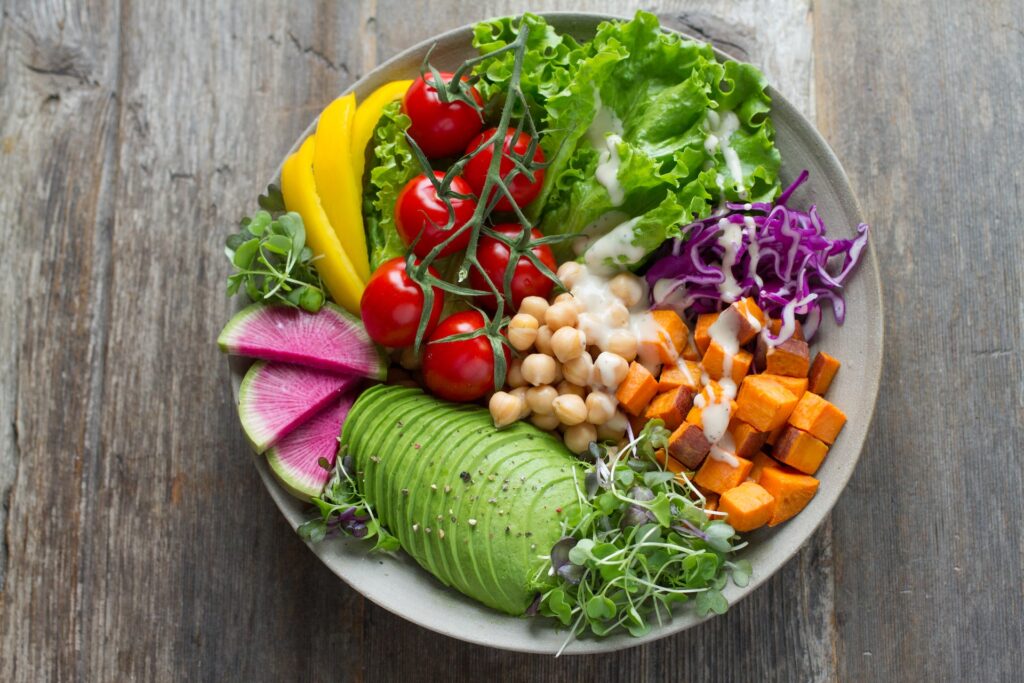Physical Address
304 North Cardinal St.
Dorchester Center, MA 02124
Physical Address
304 North Cardinal St.
Dorchester Center, MA 02124
Discover Your Purpose
Discover Your Purpose

Eating healthy is not just about eating less or following a strict plan, it’s about nourishing your body and feeling good. It can be overwhelming to navigate all the information out there about what constitutes a “healthy” diet, but don’t worry, In this post, We’ll break it down and make it easy to understand for you.
We’ll try to talk about the foods that make you feel good, how to eat the right amount, and how certain foods can affect your health. We’ll give you tips and tricks to help you find the best ways to nourish your body. By the end of this post, you’ll have the knowledge you need to make informed and healthy choices and feel great. So, let’s start this journey towards optimal wellness together!
When it comes to eating healthy food, it can be difficult to know where to start. We will try to make it simple to understand. Eating well is all about giving your body the right nutrients and making smart choices.
First, let’s talk about what it means to eat healthily foods. It’s all about eating a variety of foods that are rich in vitamins and minerals, which are not proceed and non-genetically modified (GMO), and to give your body what it needs to function optimally. A healthy diet includes foods such as fruits, vegetables, whole grains, lean proteins, and healthy eating fats.
Next, let’s talk about the importance of nutrient-dense foods. These foods are packed with nutrients, vitamins, and minerals that your body needs to function at its best. They are also a low-calorie option, making them an ideal choice for managing weight.

Try to limit the use of soybean oil, sunflower oil, canola oil and rice bran oil, and opt for healthier options such as coconut oil, olive oil, and mustard oil. Incorporating turmeric into your daily diet is a great way to add an anti-inflammatory food. Managing the size of your portions is also crucial for maintaining a healthy diet. Eating the right amount of food is key to maintaining a healthy weight and preventing overeating. It’s essential to pay attention to your body’s signals of hunger and satiety, and stop eating when you feel content.
It’s important to limit processed and genetically modified (GMO) foods in your diet, It is ideal to limit or avoid processed and genetically modified foods in your diet. Processed foods tend to contain a high amount of added sugars, sodium, and unhealthy fats, which can lead to weight gain,and increase the risk of chronic health conditions such as heart disease, diabetes, and cancer.
Healthy eating is all about making informed choices and nourishing your body with the right nutrients. By focusing on nutrient-dense foods, practicing portion control, and limiting processed foods, you’ll be on your way to achieving optimal health and wellness
When it comes to eating healthy, one of the most important things to consider is the quality of the food you’re consuming. While processed and genetically modified foods may be convenient, they often lack the essential nutrients and vitamins that our bodies need to function at their best. That’s why it’s so important to focus on consuming non-genetically modified and unprocessed foods, including grass-fed meats for healthy eating.
The benefits of consuming non-genetically modified, and unprocessed foods are countless. For starters, these foods are often packed with essential vitamins and minerals that our bodies need to thrive. They’re also typically lower in calories, making them a great choice for weight management. Not to mention, non-genetically modified, and unprocessed foods are often free from harmful chemicals and preservatives, making them a much healthier option overall.
When it comes to nutrient density, non-genetically modified and unprocessed foods truly shine. These foods are often jam-packed with essential nutrients and vitamins that our bodies need to function properly. This is especially true when it comes to fruits and vegetables, which are often rich in vitamins and minerals like vitamin D, vitamin C, vitamin A, and potassium healthy eating habit. Whole grains and lean proteins like grass-fed beef, naturally raised chicken and turkey are also great choices.

When talking about chickens, turkeys, cows and other meats that are raised in a more natural environment and allowed to forage for food instead of being kept in a factory farm and fed grains and hormones. Grass-fed meats are known to be higher in beneficial healthy eating nutrients such as omega-3 fatty acids, vitamin E and beta-carotene.
Some examples of non-genetically modified and unprocessed foods that should be included in a healthy diet include:
It’s important to note that a diet high in processed and genetically modified foods can have some drawbacks. These foods are often high in added sugars, sodium, and unhealthy fats, which can contribute to weight gain and increase the risk of chronic health conditions such as heart disease, diabetes, and certain types of cancer. So, it’s essential to limit processed and genetically modified foods in your diet and focus on nourishing your body with healthy eating like non-genetically modified and unprocessed foods, including grass-fed meats.
Consuming non-genetically modified and unprocessed foods, including grass-fed meats, is crucial for optimal health and wellness. Not only are they packed with essential nutrients and vitamins, but they’re also lower in calories and free from harmful chemicals and preservatives. So, let’s make an effort to focus on nourishing our bodies with the best quality of food. Your body will thank you!
Eating a healthy diet is crucial for our overall health and wellness, but did you know that certain foods can have a direct impact on specific health conditions? We’ll take a closer look at the link between food and some of the most common health issues, including heart disease, diabetes, and cancer. We will how our diet can either benefit or harm these conditions.
Heart disease is one of the leading health concerns in today’s society, and a diet high in saturated and trans fats can be a major contributor to it. These types of fats can raise cholesterol levels, leading to the build-up of plaque in the arteries. However, consuming foods that are high in polyunsaturated and monounsaturated fats, such as nuts, seeds and avocado, can help lower cholesterol levels and reduce the risk of heart disease by healthy eating.
Diabetes is another condition that can be affected by our diet. Consuming high amounts of added sugars and refined carbohydrates can cause blood sugar levels to spike, increasing the risk of developing diabetes. On the other hand, incorporating foods that are high in fiber, like fruits and vegetables, can help regulate blood sugar levels and improve insulin sensitivity.
The risk of certain types of cancer, particularly colon cancer, is also linked to our diet. A diet high in processed and grilled meats can increase the risk of cancer, while a diet rich in fruits and vegetables can reduce the risk.
It’s important to keep in mind that a healthy eating diet is not just about avoiding the bad foods, but also about nourishing our bodies with the essential vitamins, minerals and nutrients that we need to thrive. By focusing on nutrient-dense foods, maintaining portion control, and limiting processed and genetically modified foods, we can take steps towards achieving optimal health and preventing chronic conditions.
It’s also important to keep in mind that we all are different everyone’s body is not the same, so what works for you might not work for another persons. Consult with a healthcare professional or a registered dietitian to learn more about how to tailor your diet to your specific needs of healthy eating.
The foods we eat have a direct impact on our health and well-being. By understanding the link between food and specific health conditions, we can make more informed choices and take steps towards preventing chronic conditions. Let’s make a conscious effort to nourish our bodies with the best quality of food and take charge of our health by healthy eating.

Meal planning and preparation may look a very difficult thing for you, but keep that in mind, it’s truly a game changer when it comes to achieving optimal health and wellness by healthy eating. When we take the time to plan and prepare our meals, we set ourselves up for success. We are able to make healthier choices, save money, and most importantly, save time.
One of the most important steps in meal planning and preparation is setting aside time each week to plan your meals and make a grocery list. This can be done on a Sunday, for example, where you plan your meals for the week, make a list of the ingredients you need, and then go grocery shopping. Having a plan in place will make it easier to stick to healthy eating habits and avoid impulse purchases.
Another great tip for meal planning and preparation is to make use of leftovers. Cook extra food, and use the leftovers for lunch the next day or for a future meal. This not only saves time, but also reduces food waste.
Cooking at home is another great way to eat healthy and save money. When you cook at home, you have control over the ingredients and can make healthier choices. You can also portion your meals, which helps with weight management. One of the best things about cooking at home is that you can choose how to prepare your meals, such as steaming, sautéing, or baking instead of grilling.
Here are some examples of easy and healthy meals that can be prepared at home without using grilling:
Meal planning and preparation is an essential step towards achieving optimal health and wellness. It saves time, money, and helps make healthier choices. By dedicating a bit of time each week to plan and prepare your meals, you can set yourself up for success and enjoy delicious, homemade meals that are tailored to your dietary needs and preferences without the need for grilling.
Eating healthy can feel like a daunting task, but it doesn’t have to be! In this article, we’ve broken down the importance of consuming non-genetically modified and unprocessed foods, including those delicious grass-fed meats, and how certain foods can affect our health in a big way – whether it’s heart disease, diabetes or cancer. And let’s not forget the importance of meal planning and preparation, cooking at home, and the positive effects of probiotics on our gut health.
But let’s be real, healthy eating isn’t just about avoiding the bad stuff, it’s also about nourishing our bodies with the good stuff. The essential vitamins, minerals, and nutrients that our bodies need to thrive. By making informed choices, choosing nutrient-dense foods, practicing portion control and limiting processed and junk foods, we can take steps towards optimal health and wellness.
We acknowledge that making changes can be challenging, but we are here to provide you with support throughout the process! Whether you’re just starting on your healthy eating journey or looking to take it to the next level, there are countless resources available online, such as articles, videos, and books, that can provide additional information and inspiration. Remember, it’s about making small changes in your diet that can have a big impact on your overall health and happiness. So, let’s make a commitment to our well-being and start nourishing our bodies with the best quality of food. It’s time to live our best lives and enjoy delicious, healthy food along the way!

Meal planning and preparation may look a very difficult thing for you, but keep that in mind it’s truly a game changer when it comes to achieving optimal health and wellness. When we take the time to plan and prepare our meals, we set ourselves up for success. We are able to make healthier choices, save money, and most importantly, save time.
One of the most important steps in meal planning and preparation is setting aside time each week to plan your meals and make a grocery list. This can be done on a Sunday, for example, where you plan your meals for the week, make a list of the ingredients you need, and then go grocery shopping. Having a plan in place will make it easier to stick to healthy eating habits and avoid impulse purchases.
Another great tip for meal planning and preparation is to make use of leftovers. Cook extra food, and use the leftovers for lunch the next day or for a future meal. This not only saves time, but also reduces food waste.
Cooking at home is another great way to eat healthy and save money. When you cook at home, you have control over the ingredients and can make healthier choices. You can also portion your meals, which helps with weight management. One of the best things about cooking at home is that you can choose how to prepare your meals, such as steaming, sautéing, or baking instead of grilling.
Here are some examples of easy and healthy meals that can be prepared at home without using grilling:
Meal planning and preparation is an essential step towards achieving optimal health and wellness. It saves time, money, and helps make healthier choices for healthy eating. By dedicating a bit of time each week to plan and prepare your meals, you can set yourself up for success and enjoy delicious, homemade meals that are tailored to your dietary needs and preferences without the need for grilling.
Eating healthy can feel like a daunting task, but it doesn’t have to be! In this article, we’ve broken down the importance of consuming non-genetically modified and unprocessed foods, including those delicious grass-fed meats, and how certain foods can affect our health in a big way – whether it’s heart disease, diabetes or cancer. And let’s not forget the importance of meal planning and preparation, cooking at home, and the positive effects of probiotics on our gut health.
But let’s be real, healthy eating isn’t just about avoiding the bad stuff, it’s also about nourishing our bodies with the good stuff. The essential vitamins, minerals, and nutrients that our bodies need to thrive. By making informed choices, choosing nutrient-dense foods, practicing portion control and limiting processed and junk foods, we can take steps towards optimal health and wellness.
We acknowledge that making changes can be challenging, but we are here to provide you with support throughout the process! Whether you’re just starting on your healthy eating journey or looking to take it to the next level, there are countless resources available online, such as articles, videos, and books, that can provide additional information and inspiration. Remember, it’s about making small changes in your diet that can have a big impact on your overall health and happiness. So, let’s make a commitment to our well-being and start nourishing our bodies with the best quality of food. It’s time to live our best lives and enjoy delicious, healthy food along the way!
Photo by Brooke Lark on Unsplash
[…] are many ways to reduce inflammation quickly, and a combination of a healthy diet, regular exercise, and stress management can be highly effective in reducing inflammation and […]
[…] cheap DIY home decor ideas that will make a big impact on your home. Also, don’t forget about healthy eating, it’s an important aspect to keep in mind for a balanced […]
[…] healthy diet is crucial for good health. It provides the necessary nutrients for your body to function […]
[…] salmon is a healthy and delicious quick meals that you can have on the table in less than 30 minutes. Here’s how to […]